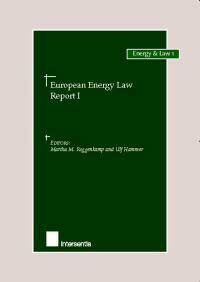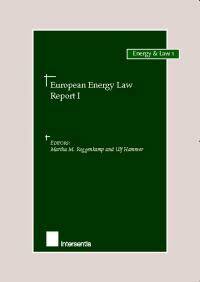
- Retrait en 2 heures
- Assortiment impressionnant
- Paiement sécurisé
- Toujours un magasin près de chez vous
- Retrait gratuit dans votre magasin Club
- 7.000.0000 titres dans notre catalogue
- Payer en toute sécurité
- Toujours un magasin près de chez vous
119,95 €
+ 239 points
Description
The European Energy Law Report I provides an overview of the most important legal developments in the field of EC and national energy law, as discussed at the European Energy Law Seminar in 2003. Whilst the book covers four different areas of legal developments, the general theme of the book is the security of supply.
The first section concentrates on issues of competition law. It examines, inter alia, the way in which Norway – as a major gas exporting country – has implemented the EC Gas Directive and has thus introduced competition in the upstream petroleum sector. Subsequently, this section describes the EC Commission's approach to recent mergers in the energy sector. Finally, the issue of State aid for the development of offshore wind parks is discussed. The next section of the book deals with the development of offshore wind parks in the North Sea area. The governments of Denmark, the Netherlands, Germany, Belgium and the UK are currently in the process of developing wind parks in the EEZ. The need to establish and exploit such wind parks has prompted the emergence of new legal regimes. It has become clear, however, that these North Sea states have chosen different legal solutions for similar problems.
The third section concentrates on the ‘security of supply’ in the stricter sense. Blackouts and brownouts during the past years have fuelled the discussion about the security and reliability of supply. One of the main issues is whether the energy liberalisation process might endanger supply security. The legal measures for guaranteeing long-term energy supply are illustrated by chapters on developments in Spain, Norway and New Zealand. The consequences of short-term interruptions following the bankruptcy of a supplier are discussed in terms of the situation in Belgium and the Netherlands.
The final section deals with underground storage. In a liberalised market the need for underground storage of gas has increased in order to provide suppliers with sufficient flexibility. In addition, underground gas storage is an important tool to secure gas supply during extremely cold winters. More recently underground storage of CO 2 has been examined with a view to reducing the emission of greenhouse gasses and as a means of furthering the production of petroleum from almost depleted oil and gas fields.
With contributions from C. Bankes, B. Barton, J. Bengtsson, M. van Beuge, A. Brautaset, J. Evans, L. Franceschini, I. del Guayo, U. Hammer, L. Hancher, C-W. Hustad, H. Knops, M. Koenings, G. Kühne, M. Roggenkamp, B. Schutyser and T. Vermeir.
The first section concentrates on issues of competition law. It examines, inter alia, the way in which Norway – as a major gas exporting country – has implemented the EC Gas Directive and has thus introduced competition in the upstream petroleum sector. Subsequently, this section describes the EC Commission's approach to recent mergers in the energy sector. Finally, the issue of State aid for the development of offshore wind parks is discussed. The next section of the book deals with the development of offshore wind parks in the North Sea area. The governments of Denmark, the Netherlands, Germany, Belgium and the UK are currently in the process of developing wind parks in the EEZ. The need to establish and exploit such wind parks has prompted the emergence of new legal regimes. It has become clear, however, that these North Sea states have chosen different legal solutions for similar problems.
The third section concentrates on the ‘security of supply’ in the stricter sense. Blackouts and brownouts during the past years have fuelled the discussion about the security and reliability of supply. One of the main issues is whether the energy liberalisation process might endanger supply security. The legal measures for guaranteeing long-term energy supply are illustrated by chapters on developments in Spain, Norway and New Zealand. The consequences of short-term interruptions following the bankruptcy of a supplier are discussed in terms of the situation in Belgium and the Netherlands.
The final section deals with underground storage. In a liberalised market the need for underground storage of gas has increased in order to provide suppliers with sufficient flexibility. In addition, underground gas storage is an important tool to secure gas supply during extremely cold winters. More recently underground storage of CO 2 has been examined with a view to reducing the emission of greenhouse gasses and as a means of furthering the production of petroleum from almost depleted oil and gas fields.
With contributions from C. Bankes, B. Barton, J. Bengtsson, M. van Beuge, A. Brautaset, J. Evans, L. Franceschini, I. del Guayo, U. Hammer, L. Hancher, C-W. Hustad, H. Knops, M. Koenings, G. Kühne, M. Roggenkamp, B. Schutyser and T. Vermeir.
Spécifications
Parties prenantes
- Auteur(s) :
- Editeur:
Contenu
- Nombre de pages :
- 380
- Langue:
- Anglais
Caractéristiques
- EAN:
- 9789050953702
- Date de parution :
- 18-06-04
- Format:
- Livre broché
- Poids :
- 709 g

Seulement chez Librairie Club
+ 239 points sur votre carte client de Librairie Club
Les avis
Nous publions uniquement les avis qui respectent les conditions requises. Consultez nos conditions pour les avis.





